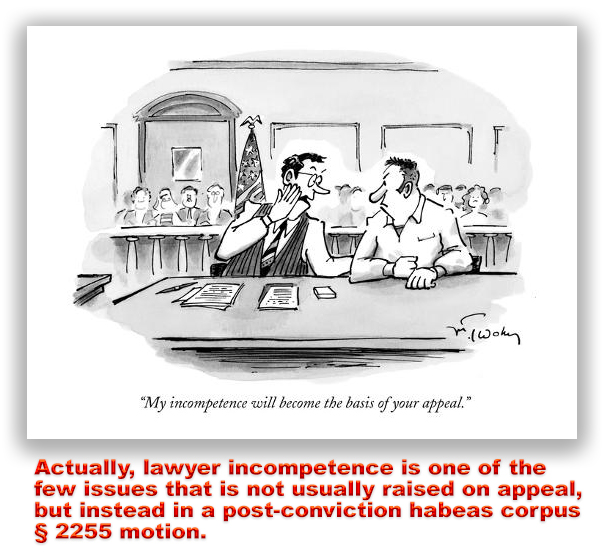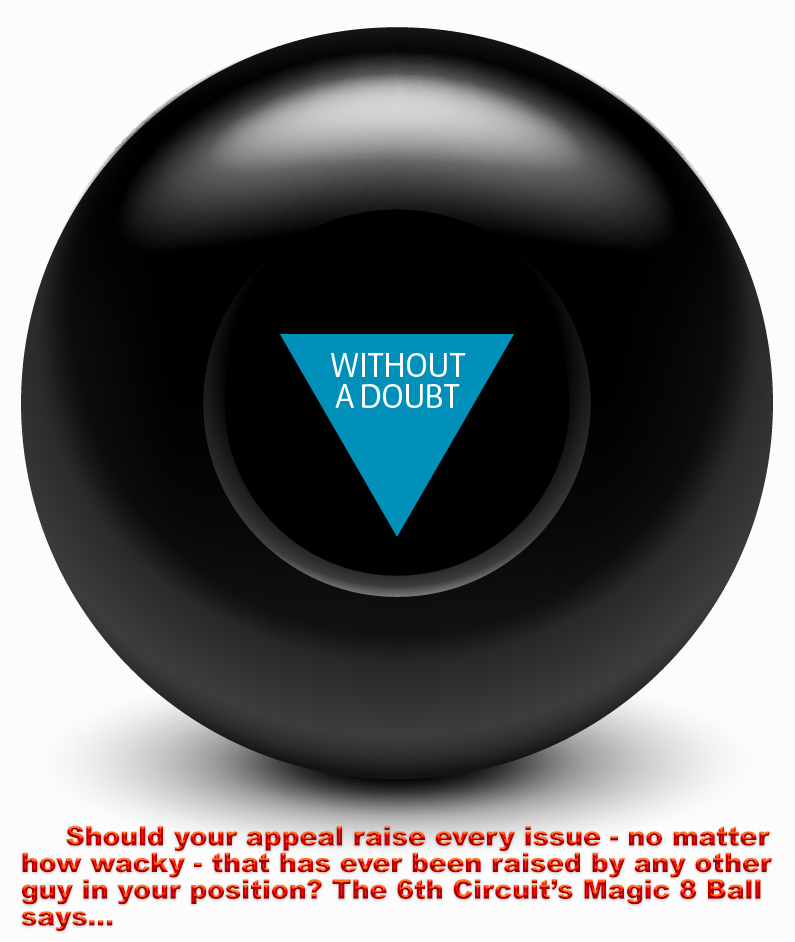We post news and comment on federal criminal justice issues, focused primarily on trial and post-conviction matters, legislative initiatives, and sentencing issues.

PROCEDURAL WHIPSAW
There’s an old military axiom, correctly or not attributed to World War II General Omar Bradley, that “amateurs talk strategy; professionals talk logistics.” If there is a criminal law version of that, it would be “prisoners talk substance; judges talk procedure.”
 Time and again, inmates say they want to challenge their conviction or sentence because their lawyers were idiots, the government was corrupt, or the witnesses lied. They often have great arguments and convincing proof. But when I ask, “so how are you going to get back into court after having lost two prior 2255 motions and one 2241 motion, and after 10 years have passed since you were convicted?” I usually just hear silence but occasionally a mumbled, “but man, I have a great case.”
Time and again, inmates say they want to challenge their conviction or sentence because their lawyers were idiots, the government was corrupt, or the witnesses lied. They often have great arguments and convincing proof. But when I ask, “so how are you going to get back into court after having lost two prior 2255 motions and one 2241 motion, and after 10 years have passed since you were convicted?” I usually just hear silence but occasionally a mumbled, “but man, I have a great case.”
The 6th Circuit last week reminded us just how hard it can be to get a post-conviction argument heard, even a “great case” and even when you think you’ve done everything right.
Johnny Gatewood was convicted in 1999 under the 18 USC § 3559(c), a “three strikes” statute that hammers people convicted of violent crimes who have been convicted of prior violent crimes. One of Johnny’s prior “strikes” was an Arkansas robbery. After the Supreme Court Johnson v. United States decision in 2015 held the Armed Career Criminal Act’s “crime of violence” definition was unconstitutionally vague, Johnny filed a 2255 motion arguing his prior robbery was no longer a crime of violence.
 The government countered that Johnny had procedurally defaulted on his argument, because he didn’t raise his Arkansas robbery claim in his direct appeal, 15 years before Johnson was decided. Generally, if a claim could have been raised on the appeal from the original conviction (generally called “direct appeal”) but was not, it is considered procedurally defaulted. A procedurally defaulted claim cannot be raised later in a 2255 motion, for the very good and efficient reason that a direct appeal is where you appeal. A post-conviction motion is not an assistant deputy appeal, but instead, it is reserved for issues that could not have been raised on appeal because they were not around at the time, or because one needs to develop an evidentiary record.
The government countered that Johnny had procedurally defaulted on his argument, because he didn’t raise his Arkansas robbery claim in his direct appeal, 15 years before Johnson was decided. Generally, if a claim could have been raised on the appeal from the original conviction (generally called “direct appeal”) but was not, it is considered procedurally defaulted. A procedurally defaulted claim cannot be raised later in a 2255 motion, for the very good and efficient reason that a direct appeal is where you appeal. A post-conviction motion is not an assistant deputy appeal, but instead, it is reserved for issues that could not have been raised on appeal because they were not around at the time, or because one needs to develop an evidentiary record.
To excuse a procedural default, a defendant must show “cause,” a good reason for not raising the claim on appeal, and must show he or she was prejudiced by the error alleged in the claim.
One way to show “cause” is to argue that claim is so novel that its legal basis “was not reasonably available” on appeal. That’s what Johnny argued.
Last week, the 6th Circuit turned Johnny down. The Circuit held the vagueness issue the Supreme Court decided in the 2015 Johnson case had in fact been raised back in 1997 in several other cases. This meant, the Circuit reasoned, that the argument was available to Johnny’s counsel at the time if he had only cared to use it.
Johnny agreed the issue was being raised in some cases, but everyone else who had raised it got hammered. Thus, he argued, raising the vagueness claim would have been futile, “foreclosed,” he said, “by ‘a near-unanimous body of lower court authority’.”
 The 6th Circuit didn’t care. Instead, it ruled that such futility cannot be excuse a procedural default, “at least where the source of the ‘perceived futility’ is adverse state or lower court precedent.” Instead, the Circuit said, “unless the Supreme Court has decisively foreclosed an argument, declarations of its futility are premature.” In other words, you must be sure to beat your head against the wall (and waste everyone’s time) by raising every conceivable issue that has been raised by every other defendant in your position, in the vain hope that a decade or two hence, the Supreme Court might hear that issue and decide it favorably.
The 6th Circuit didn’t care. Instead, it ruled that such futility cannot be excuse a procedural default, “at least where the source of the ‘perceived futility’ is adverse state or lower court precedent.” Instead, the Circuit said, “unless the Supreme Court has decisively foreclosed an argument, declarations of its futility are premature.” In other words, you must be sure to beat your head against the wall (and waste everyone’s time) by raising every conceivable issue that has been raised by every other defendant in your position, in the vain hope that a decade or two hence, the Supreme Court might hear that issue and decide it favorably.
In short, you’re procedurally sandbagged: if your lawyer didn’t see Johnson coming 15 years before the decision was handed down, tough luck. No court would say the attorney was ineffective because he or she couldn’t foretell the future. But if your Magic 8 Ball didn’t tell you to raise an issue that was still 15 years away, the 6th said, it’s your fault.
The Circuit admitted that two other circuits have gone the other way on the issue, and held that lower court rulings do create futility. Maybe the circuit split means that the Supreme Court will settle the question. Until then, it is futile to argue futility.
Gatewood v. United States, Case No. 19-6297, 2020 U.S. App. LEXIS 34200 (6th Cir Oct 29, 2020)
– Thomas L. Root

